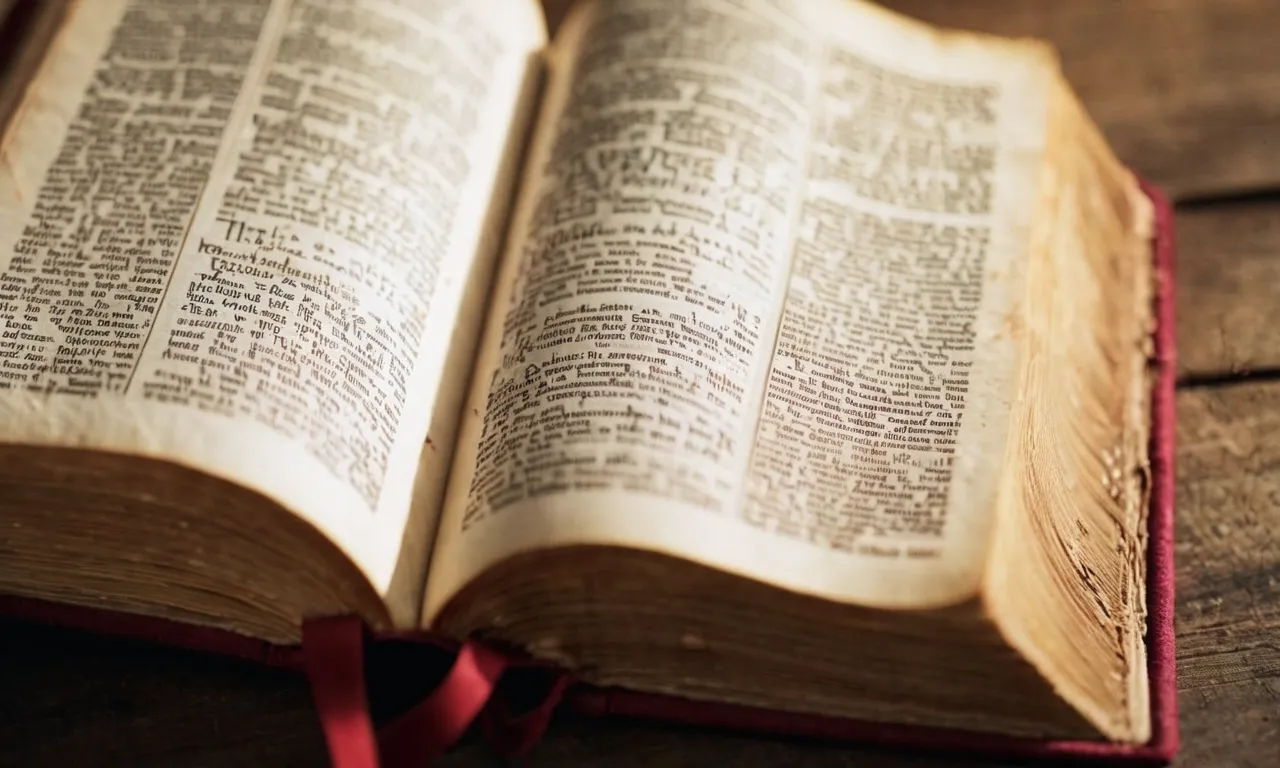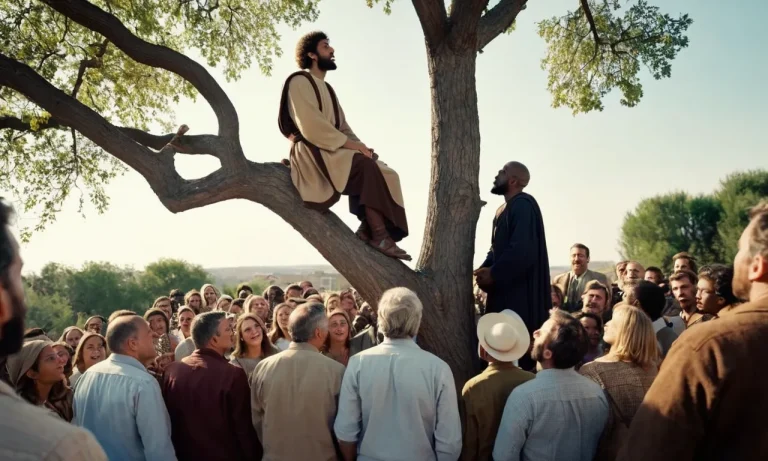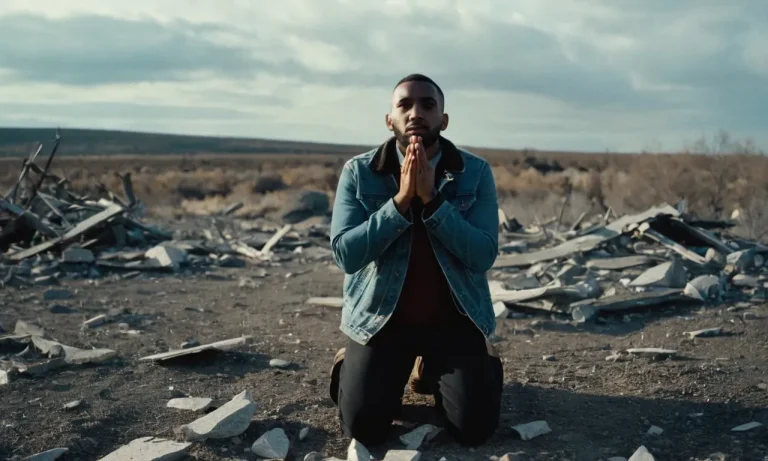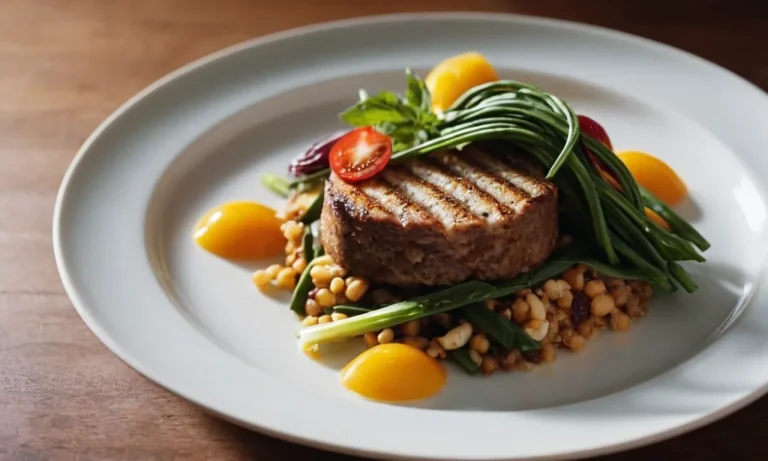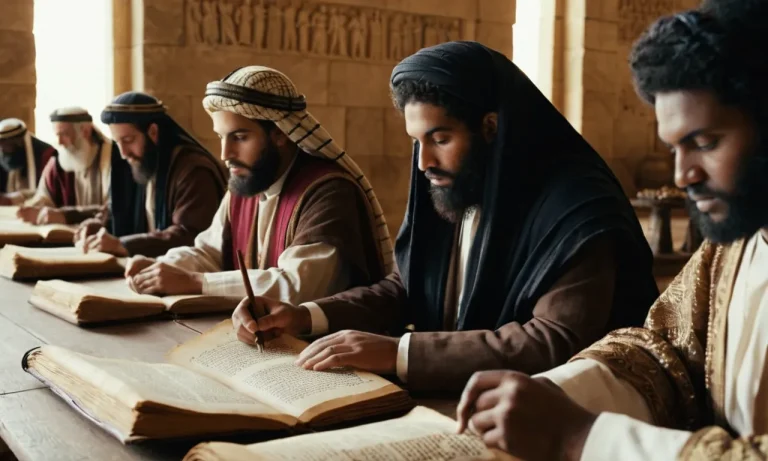What Is Thanksgiving In The Bible?
Thanksgiving is a beloved American holiday celebrated each November. Families across the nation gather to enjoy a bountiful feast and reflect on all they are grateful for. But did you know that the concept of giving thanks has Biblical origins?
In this comprehensive guide, we will explore the spiritual roots of Thanksgiving.
If you’re short on time, here’s a quick answer: The word ‘thanksgiving’ appears in the Bible numerous times, referring to both praise and gratitude towards God. While the Pilgrims are often credited with originating the modern Thanksgiving holiday, the practice of celebrating harvest festivals and giving thanks dates back to ancient Biblical times.
Origin of Biblical Thanksgivings
The Jewish Festival of Sukkot
The Jewish festival of Sukkot, also known as the Feast of Booths or Tabernacles, has strong connections to thanksgiving in the Bible. Sukkot commemorates the 40 years that the Israelites wandered in the desert and lived in temporary shelters after the exodus from Egypt (Leviticus 23:33-43).
During Sukkot, Jewish people build small huts called sukkahs and eat their meals inside them. This reminds them of God’s provisions during the years in the wilderness. Sukkot also celebrates the autumn harvest, so it is a time to thank God for a bountiful crop.
Sukkot lasts seven days, and the book of Leviticus commands there to be “a day of solemn rest, a memorial proclaimed with blast of trumpets, a holy convocation” (Leviticus 23:24) on the first day. So Sukkot has been a festival of thanksgiving for around 3,000 years!
Ancient Rabbis also considered Sukkot the time when God determines the world’s rainfall for the coming year. So the Jewish people would pray and thank God for rain and bounty during this festival.
Psalms of Thanksgiving
The book of Psalms contains many songs and poems that express thanksgiving toward God. For example, Psalm 100 calls everyone to “Shout for joy to the Lord, all the earth. Worship the Lord with gladness; come before him with joyful songs” (Psalms 100:1-2).
Other thanksgiving Psalms include Psalms 9, 18, 30, 92, 95, 98, 105, 107, 116, 118, 138 and 139.
Many Psalms first recount God’s blessings and providential work before offering gratitude and thanksgiving. For example, Psalm 92 proclaims “It is good to praise the Lord and make music to your name, O Most High” (verse 1) after speaking of God’s lovingkindness in the first half of the poem.
The connection between recounting God’s blessings and responding in thanksgiving occurs throughout the Psalms.
Jesus Giving Thanks
The Gospels record Jesus giving thanks on several occasions, mainly before feeding miracles and the Last Supper. For example, in Matthew 15:36, “He took the seven loaves and the fish, and when He had given thanks He broke them and gave them to the disciples.”
Here Jesus offers thanks for provision before miraculously feeding over 4,000 people.
At the Last Supper, described in Matthew 26:27, Jesus gives thanks before sharing the Passover meal with His disciples: “Then He took a cup, and gave thanks, and gave it to them, saying, ‘Drink from it, all of you.
‘” Every time Christians celebrate Communion in remembrance of Jesus, it echoes this tradition of giving thanks tied to key moments in the Bible.
Early Christian Thanksgiving Traditions
Didache Instructions
The Didache, an early Christian text dating back to the first century AD, contains some of the earliest recorded instructions for giving thanks during religious services. In the Didache’s section on communal meals, it directs Christians to “first, concerning the cup, give thanks” before partaking of wine and bread (source).
These meals involving “Eucharistic thanksgiving” prayers laid important groundwork for later Thanksgiving holiday traditions.
St. Paul’s Letters of Gratitude
The apostle Paul helped shape attitudes of thanksgiving in early Christianity through his New Testament writings. Several of his letters open with statements thanking God for the faith of various churches (Romans 1:8-10, 1 Corinthians 1:4-9).
By beginning many letters with gratitude, Paul modeled the central place thanksgiving should hold in Christian practice. His prayers likely influenced later eucharistic prayers and feast day thanksgivings.
Eucharistic Thanksgiving Prayers
Early Christian celebrations of the Lord’s Supper involved reciting thanksgiving prayers before partaking of the bread and wine. The word “Eucharist” comes from the Greek word for thanksgiving. Though these ritual meal prayers took various forms in different church regions, almost all contained expressions of gratitude toward God.
For instance, the Liturgy of St. Basil from around 370 AD praises God for everything from creation, to salvation in Christ, to the Eucharistic bread and cup (read here). Such detailed thanksgiving paved the way for more extensive annual Thanksgiving feasts.
Puritan Influence on Modern Thanksgiving
Puritan Beliefs About Thanksgiving
The Puritans, a group of English Protestants who settled in Massachusetts in the early 1600s, had a tremendous influence on the modern Thanksgiving holiday. The Puritans believed that regularly scheduled times of fasting and thanksgiving were important for the spiritual life of their community.
They held thanksgiving feasts to celebrate happy occasions like good harvests. The Puritans also believed thanksgiving was a way to express gratitude to God for His providence. These Puritan beliefs laid the foundation for our modern Thanksgiving holiday.
The 1621 Plymouth Thanksgiving Feast
The Pilgrims who settled Plymouth Colony in 1620 held a three-day harvest feast in 1621, which many consider to be the first Thanksgiving. About 50 Pilgrims and 90 Wampanoag Indians attended. Historians debate whether this feast was a one-time event or if the Pilgrims regularly held similar harvest celebrations.
However, we do know the Pilgrims gave thanks to God for helping them survive their first year in the New World. The Pilgrim’s 1621 feast bore some resemblance to today’s Thanksgiving in its religious overtones and celebration of harvest bounty.
Thanksgiving Proclamations in Early America
After the Pilgrims, various colonies and states issued thanksgiving proclamations calling for certain days to be set aside for giving thanks to God. For example, in 1676 the governing council of Charlestown, Massachusetts proclaimed June 29 as a day of thanksgiving for their deliverance from danger.
In 1777, the Continental Congress declared the first national American thanksgiving on December 18. And in 1789, President George Washington proclaimed Thursday, November 26 as a national day of thanksgiving, influenced by the Puritan traditions of his day.
The intermittent issuance of thanksgiving proclamations continued until Abraham Lincoln made it a yearly national holiday in 1863.
Modern Thanksgiving Holiday Traditions
Family Gatherings and Feasts
Thanksgiving is a time for family and friends to come together and give thanks over a bountiful feast. Many families have traditions that have been passed down for generations. Common Thanksgiving traditions include:
- Preparing traditional dishes like turkey, stuffing, mashed potatoes, cranberry sauce, and pumpkin pie.
- Watching the Macy’s Thanksgiving Day Parade on TV and football games afterwards.
- Going around the dinner table and saying what everyone is thankful for.
- Playing family games like charades or touch football.
According to a 2021 survey by the National Retail Federation, 88% of Americans celebrate Thanksgiving with family and friends. Thanksgiving weekend travel is also very popular, with over 54 million Americans traveling 50 miles or more from home.
Thanksgiving provides a great opportunity to reconnect with loved ones over delicious food and create lasting memories.
Giving Thanks and Charity
Thanksgiving is a time to reflect on blessings and practice gratitude. Many families say grace before Thanksgiving dinner, thanking God for all they have. Churches hold worship services focused on giving thanks. Americans also give back to those less fortunate on Thanksgiving.
According to GivingUSA, charitable donations peak in November and December, with a large portion coming around Thanksgiving. Many organizations host food drives and volunteer events. Popular ways Americans give back include:
- Volunteering at soup kitchens or food pantries.
- Donating money, canned goods, or turkeys to charity.
- Participating in turkey trots, runs/walks supporting local causes.
- Distributing meals to the sick or elderly who can’t leave home.
The spirit of gratitude and giving makes the Thanksgiving season special. In 2021, over 101 million Americans volunteered their time, and charitable giving reached a record $485 billion.
Football Games and Parades
Thanksgiving weekend is full of entertainment and recreation. Two iconic events are the Macy’s Thanksgiving Day Parade and NFL football games.
The Macy’s Parade began in 1924 and today features giant balloons, floats, marching bands, celebrities, Santa Claus, and more. Over 3 million spectators line the streets of Manhattan, and over 50 million watch on TV. It has been held every year except during World War II.
The NFL has hosted Thanksgiving games since 1920. The Detroit Lions and Dallas Cowboys traditionally host games each year, broadcast on national TV. Upwards of 20 million viewers tune in. College teams and high school teams also compete in their own version of “Turkey Bowls.”
| 2021 NFL Thanksgiving Day Viewers | 20.1 million (CBS) |
| 2021 Macy’s Parade Viewers | 22.1 million (NBC) |
Thanksgiving parades and football combine entertainment, tradition, and delicious food. They have become ingrained into the holiday weekend for many Americans.
Conclusion
As we have explored, while Thanksgiving is ingrained as an American cultural tradition, its roots trace back to ancient Biblical customs of celebrating harvests and giving thanks to God. The Jewish festival of Sukkot, early Christian Eucharists, and Puritan colonist harvest feasts all contributed threads that are woven into our modern holiday tapestry.
So when you gather loved ones, feast on turkey and sides, and reflect on gratitude this November, remember that you are participating in a tradition that spans back thousands of years to Biblical times.

